Home Cooling Tips: Window AC Unit vs Central Air
In your quest for home cooling tips, are you wondering about central air vs window units?
Or should you keep cooling your home through window air conditioning units.
What about those new fangled mini split air conditioning units also called ductless air conditioning aka heat pumps for warming your home in the winter?
This post about home cooling tips, focusing on how a window ac unit versus central air stacks up, is perpetually popular, regardless of the time of year.
It explores the pros and cons of cooling your home with window air conditioning, ductless air conditioning system, and central air.
When window ac units may make sense
Window ac units are cheaper in the short run.
They make the most sense if you live in a small home or apartment.
Another air conditioning option–you can buy a portable air conditioner that you vent through a window.
It looks like a large dehumidifier with a long vented tube going to the window. In fact, many portable air conditioners have a built-in dehumidifier.
Pros of a portable or window ac unit
Save this article and we’ll send it to your inbox. Plus, we’ll send you more great links each week.
There are a number of pros to buying a portable or window air conditioner to cool your home.
The first pro is price.
You can easily buy a portable ac or window ac unit for just a couple hundred dollars.
Cheapest place to buy window ac units
Want to hear where we bought cheap window ac units?
Our local Habitat for Humanity ReStore location.
For just $25 each, we purchased two window air conditioners.
They’ve been running great for years now.
We use them in our bedrooms.
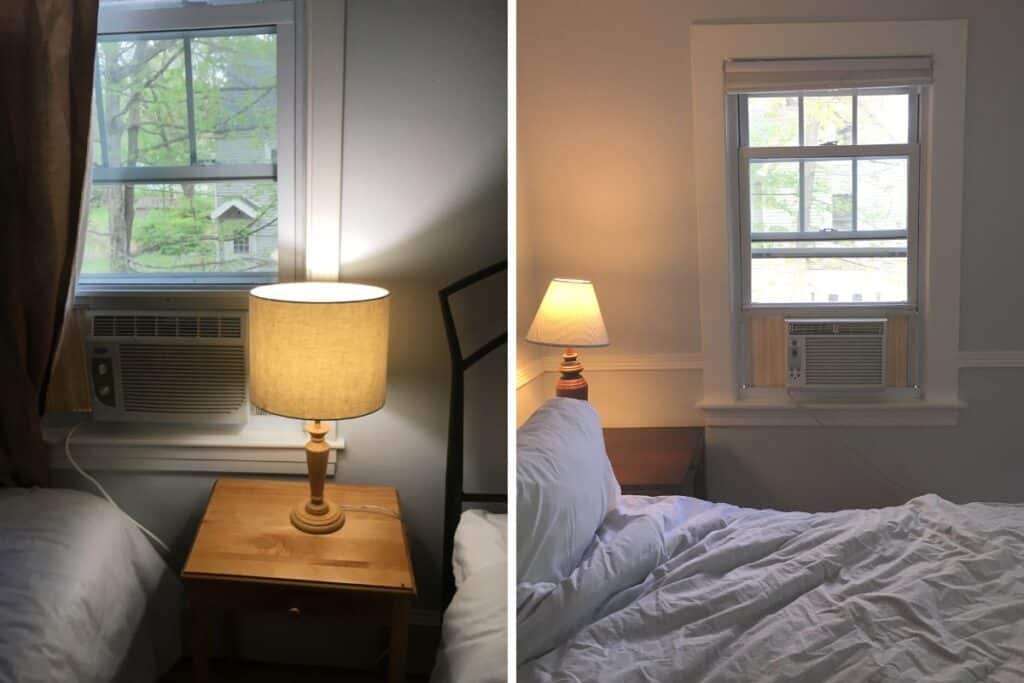
Easy air conditioning installation
The second pro is easy installation.
In other words you can install these yourself.
A window ac unit might be a bit heavier and clumsier to install, but you can definitely do it yourself.
The portable air conditioner is super easy to install DIY.
Even my college-aged daughter was able to install one in the house where she lived senior year.
A third–and bonus–pro to the portable air conditioner that looks like a dehumidifier?
You can move it from room to room.
So if you really want to save money, you can buy one unit per floor of your house and then just roll it from room to room during the summertime.
Cons of a portable or window ac unit
Perhaps the biggest “con” when it comes to window ac units is humidity.
That is, the window units don’t always do a good job of keeping the humidity out.
So, if you live in a humid location and are worried about cheap home cooling tips and dealing with humidity, here is your solution.
Go with a portable air conditioner with the built-in dehumidifier.
Where to buy ac window units
As I mentioned, we were able to get a deal on small ac window units at ReStore.
But maybe you don’t want to buy used.
So, where can you shop?
Here is a list of places, with links to those online options.
What is a mini split or ductless air conditioning?
One of the newest ways to keep your home cool without central air is with something called a mini split or a heat pump or a ductless air conditioning system.
You can read more here about how heat pumps work.
What is central air conditioning?
Central air conditioning is a way of cooling the home by using an existing home heating system made up of ducts.
You’ll probably know that your home could have central air if you have a forced air heating system.
Got vents in the ceilings, walls or floors or your home?
Then you likely have an existing duct system that can handle adding an air conditioning system to your HVAC. HVAC stands for heating, ventilation and air conditioning.
According to experts there are three elements that really matter when it comes to air conditioning preferences:
- the climate where you live (hot and humid Houston versus dry Denver)
- how well-insulated your home is
- your personal preferences are
Issues with humidity
If you’re looking to cool your home and lower the humidity, I would recommend trying a dehumidifier.
We’ve lived in homes with un-air conditioned basements.
These were always damp basements.
However, once we got a dehumidifier going down there, the basement always stayed cool and dry.
Here is my article about dehumidifiers.
You can try the same in your home, if you can’t afford to install central air.
However, if you are looking for cooling efficiency, central air is your best bet.
Because when it comes to central air vs window units and humidity, central air wins hands down.
Not only does a central air system cool your house.
But a good system is able to filter the air for allergens and pollutants, and it controls humidity, too.
Again, if you have a forced air heating system, getting a central air system installed should be a snap. Why not submit a Home Advisor request today?
State sales tax holidays, focused on energy-efficient improvements, are the perfect time to purchase new heating and cooling systems.
Why your central air system needs a filter
Speaking of filters, if you have a forced air heating or cooling system, you must change filters monthly.
I’ve found that when I change my filters every month, my central air system works more efficiently.
That means my house stays cooler in summer, and my electric bills don’t go sky high.
How do I manage to change the filters monthly without having to run to the store each time?
I signed up for an air filter subscription service.
On a regular basis the company ships me home air filters I need for my specific HVAC system.
The filters cost the same as what I would pay at my local hardware or big box store.
But because they come to my front door, it saves me time.
Also, because I am changing those filters regularly, I am saving money, too.
How?
One, I’m keeping my cooling bills as low as possible.
And two, by keeping a clean filter in my HVAC system at all times, I’m keeping the system clean and make it less likely it will break down.
The role insulation plays in cooling
Maybe humidity isn’t your problem. But insulation is.
And that can affect how well or poorly your central air can cool you home.
Insulation isn’t just in the walls, by the way.
We’re also talking about well-insulated windows and, believe it or not, a well-insulated attic.
In the summer, temperatures in the attic often climb to more than 140 degrees.
Even when the first floor is comfortable, this constant flow of heat from the attic can bake your bedrooms upstairs.
Most people don’t think of insulation as a way to keep cool.
However, increasing levels in your attic can make a huge difference.
You can install insulation yourself by buying it at a store like Home Depot.
Or you can find a pro to add insulation.
Again, this is where a contractor-referral service like Home Advisor can help you out.
How to keep cool and save money
Now that you know the pros and cons of central air vs window units, here are additional tips on how you can stay cool and save money.
Not surprisingly the demand for electricity rises as the weather gets hot and air conditioners start humming.
There’s no reason your budget has to suffer just so you can be comfortable.
Here are my additional tips
Install a Programmable Thermostat
Installing a programmable thermostat is smart.
You can raise the setting to the highest comfortable temperature when you’re out of the house.
No reason to cool an empty house.
You can program your thermostat to kick in right before you get home from work.
Plus, you can save 3 to 5 percent on your air conditioning costs for each degree you raise the thermostat.
We installed a Nest thermostat last year; I love that I can set my home to “eco mode” from my phone.
A programmable thermostat is one of the best ways to keep cool and save money.
FYI, if you happen to have an Alexa, the Nest smart thermostat works with it!
Speaking of Alexa, here is my blog post with five best Alexa hacks for the kitchen!
Close Doors
There are probably lots of doors throughout your house or apartment that you should keep closed on hot days.
I’m not just talking about your front door either.
You should close doors leading to uncooled and vacant parts of your home.
If you have central air conditioning, close off vents to unused rooms.
Use a Ceiling Fan
Using a ceiling fan can make a room feel cooler on your skin.
This is true, even if you have air conditioning.
Many of the rooms in our house have ceiling fans.
These can help people “feel” cooler without cranking the a/c.
Best of all ceiling fans don’t use a lot of energy.
Here are some additional tips to stay cool in summer.
Seal Holes and Cracks Around Doors and Windows
Eliminate air leaks around window air conditioners with foam insulation or weather-stripping.
You can do this sealing and weather stripping yourself on a weekend day.
Or you can hire a professional to do it for you.
Block Out the Sun
Close blinds, shades and draperies facing the sun.
This will keep out the sun’s heat.
This is an easy way to help fans and air conditioners cool more efficiently.
We always get blackout drapes to help keep the sun out.
I love the ones on Amazon with the grommets at the top!
Turn Off Power Sources
TVs, computers and other electronic devices draw power when they are in standby mode or turned off but still plugged in.
Plug electronics into power strips and turn off the power switch when the items are not in use.
Some of them give off residual heat that could raise the temperature of the room so turning them off is a good idea.
Invest in a Dehumidifer
As I mentioned earlier humidity levels affect your ability to feel cool.
You can reduce the humidity level in your home by investing in a dehumidifier.
Putting one in your basement, like we have done, can help cut down on musty smells as well.
Finally, if all else fails, it might be time to bring in an expert.
That’s what we did when had a home energy audit.
It let us know, in real time, how we could improve the energy efficiency of our home.
This article explains more about the benefits of a dehumidifier, especially in a basement.


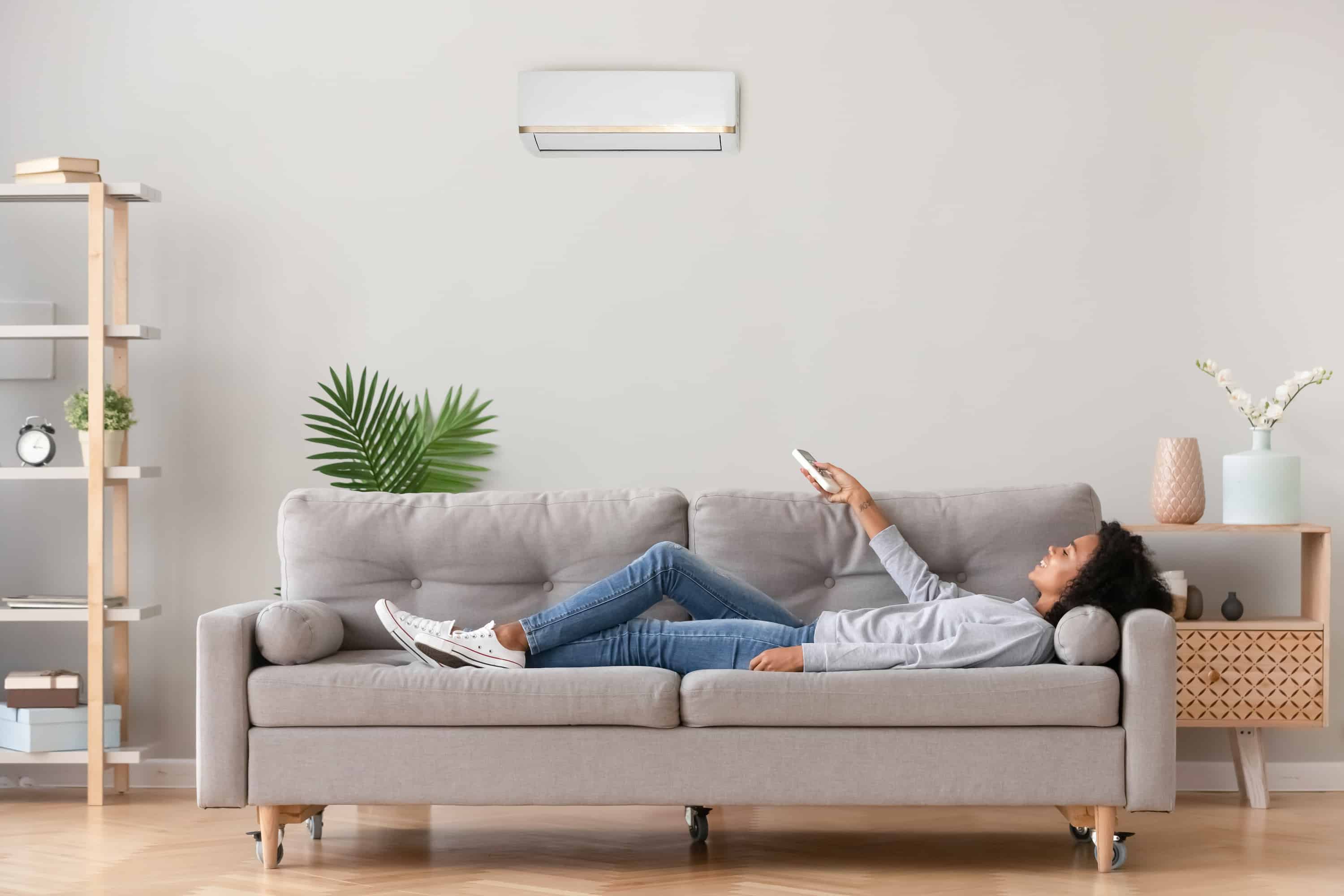
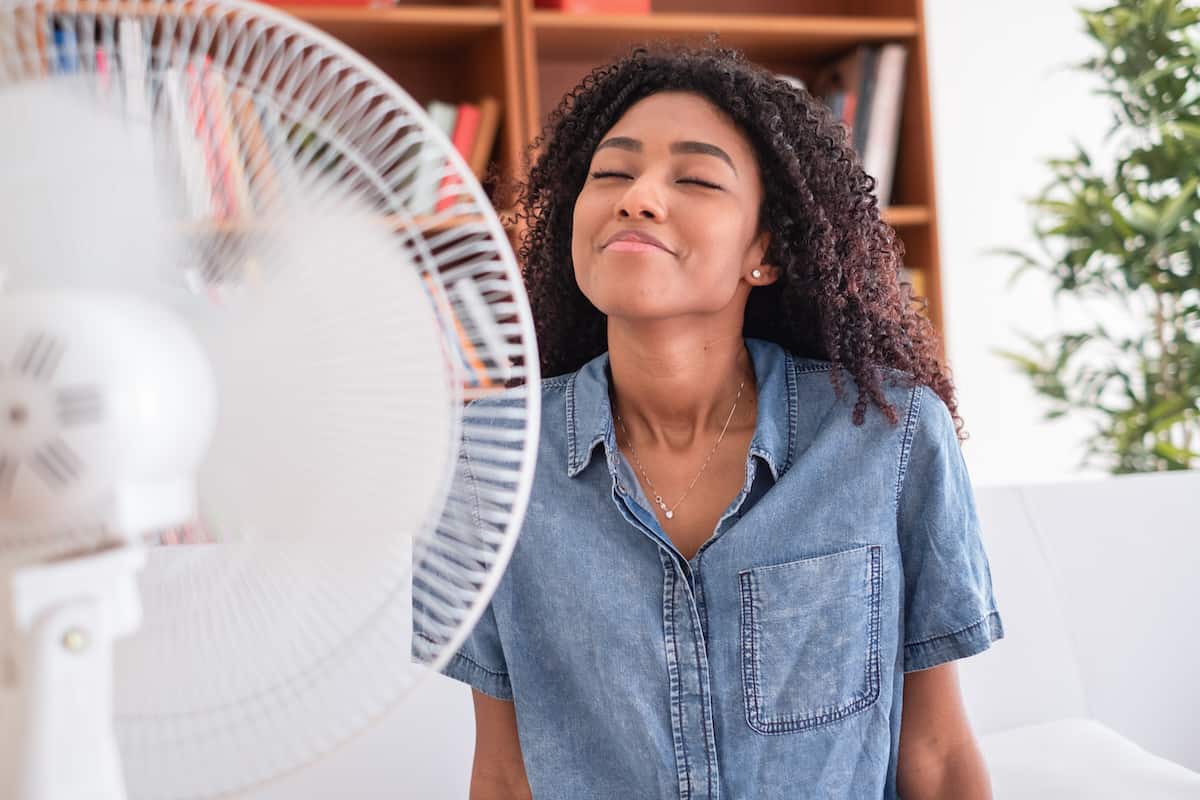
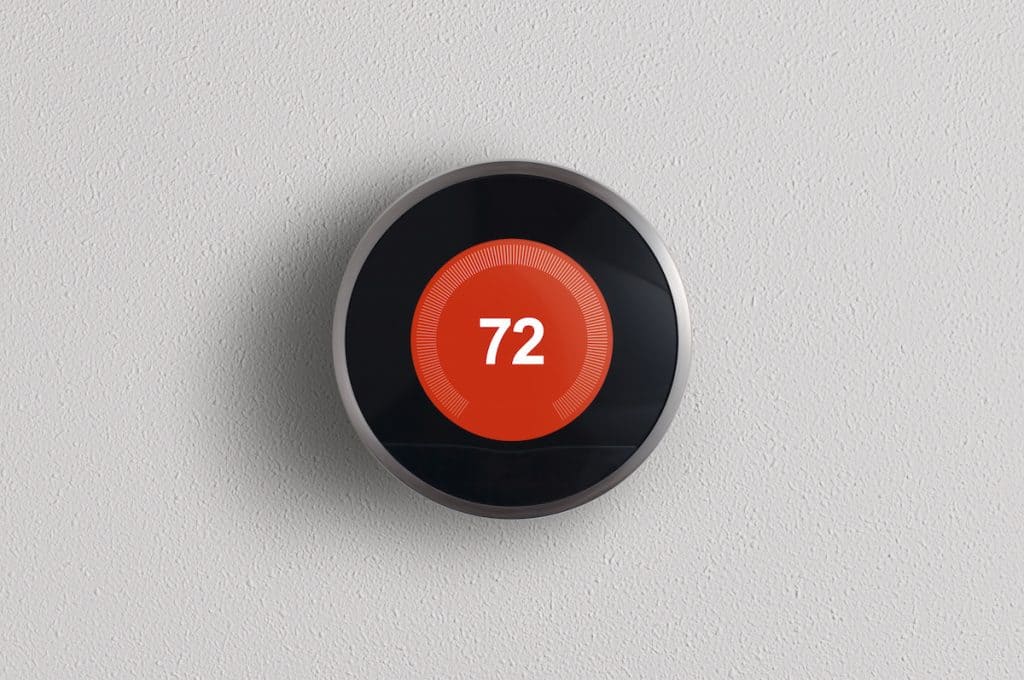
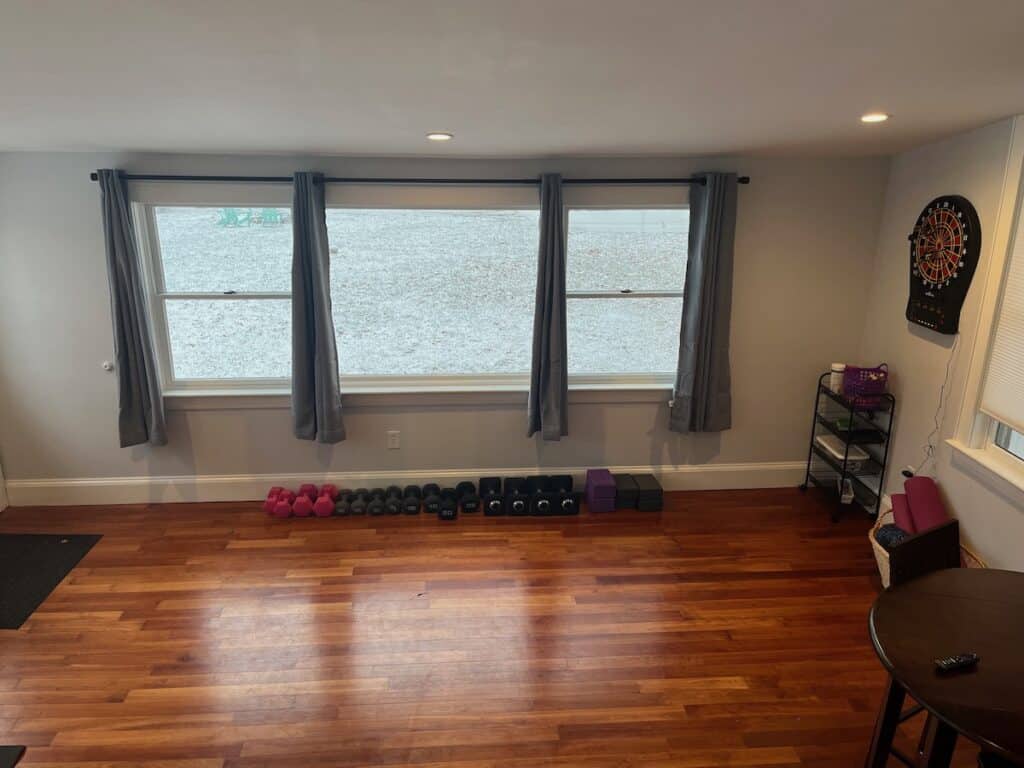
They also mentioned a dehumidifier. By reducing the humidity and using a ceiling fan you can notice a significant difference.
For night/sleeping:
Wether or not central air is better for you or not really depends on how many bedrooms are used at night. If it’s just 1 or 2 you are going to want to use window units. If it’s 3+ and the house isn’t huge then maybe the central air is better. If you are running 3+ bedrooms then chances are you have a big house and again window units are probably better.
The reasoning is simple even if the window unit is half as efficient you are going to cooling much less than half of your home. During the day I run the central air. I have an electronic damper that shuts off the bedroom as long as it is unoccupied and the doors are closed.
I also bought a $25 temp sensor that plugs into the wall. It came from SONOFF. I also bought 10 of their single channel smart switchs. They cost around $6 ea and you have to wire it into the cord or in the device.
That controls the on/off functionality of the window unit.
——-
Lastly if you live in a climate that works well with heat pumps then I’d recommend looking into a mini-split system. With a mini split you choose which rooms get a system and even though usually all the interior units are connected to the same exterior unit you will still be able to control each split separately.
With a mini-split you don’t have to worry about getting too big of a unit either so you can buy a nice big one with just 1 or 2 ducts and add on later. Being oversized does NOT reduce its efficiency like a standard central air conditioner.
If you live in a heat pump capable area the mini-split can heat your room very well using the heat pump method.
Lastly I also have a space heater. I converted it over to be a smart system (can only do this if your heater has dials and switches not button). In the winter the house gets set to 60 and the bedroom is kept at 67-68. Even though electricity cost much more than gas the simple fact that I’m cooling 120 square feet vs 1400.
The smart switches I use are from SONOFF. I have a stack of the single channel units and a few multi channel pros. The pros respond to wireless radio remotes that you can put on your keychain. So those are more for lights and garage etc.
Maybe central air is more efficient technically but in reality much more expensive to buy and use. You’re supposed to have them serviced yearly at around $100 a call. All units get old and become less efficient than new units but replacing central will cost thousands while window units are only a couple or few hundred dollars. Window units are essentially zone cooling while central uses thousands of watts of electricity when running to cool the whole house. If you don’t mind wasting money and electricity, have a giant house or don’t care about the environment you probably prefer central. But if you’re frugal and want to replace your units every 5 to 10 years to keep them up to date then window units are the best way to go. Technicians make a living from central air, they make nothing from window units. Guess which ones they recommend. Unfortunately, apartment dwellers usually have no choice but they don’t own any of it anyway and only have to pay the utility bill.
I know this thread is old but I was wondering what would be the best way to cool a mobile home that is affordable. My in-laws have window units but I just wanna make sure.
I would think that mobile homes have special needs. I don’t feel comfortable making a recommendation but would suggest you ask a professional A/C person. Good luck.
A lot also depends on your house. A lot of older homes in Northern climates still have radiators to heat the home and were never built for central air. I lived in Northern Ohio (which was a very typical house in my community) and the only downside was it had radiant heat. The cost to rip out radiators and upgrade to central heat and air was obscenely expensive. So sometimes you have to factor in the costs of installing central air.
We just remodeled (big time, I’m still recovering) and one change is the addition of a ceiling fan to the master bedroom. Oh, my, I love it! It has a remote control, too. For this, I might forgive my husband and the carpenters for the four weeks I had to use a laundromat while they were building the new laundry closet….
I use window units for my small house. They don’t use much energy and I only cool the lower floor during the day. Another benefit: my allergies have almost disappeared since going from central air to window units.
Wow! Thanks! Good to know that! I have bad allergies and 3, 4 legged fur babes, part of my allergies.lol Never thought of this. Glad I read all comments. Looking to possibly move from central a/c to window unit home. And researching. So thanks for this info.